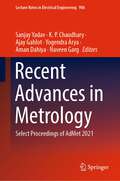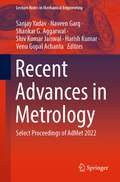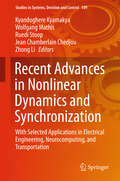- Table View
- List View
Recent Advances in Material, Manufacturing, and Machine Learning: Proceedings of 1st International Conference (RAMMML-22), Volume 1
by Rajiv Gupta Devendra Deshmukh Awanikumar P. Patil Naveen Kumar Shrivastava Jayant Giri R. B. ChadgeThe role of manufacturing in a country’s economy and societal development has long been established through their wealth generating capabilities. To enhance and widen our knowledge of materials and to increase innovation and responsiveness to ever-increasing international needs, more in-depth studies of functionally graded materials/tailor-made materials, recent advancements in manufacturing processes and new design philosophies are needed at present. The objective of this volume is to bring together experts from academic institutions, industries and research organizations and professional engineers for sharing of knowledge, expertise and experience in the emerging trends related to design, advanced materials processing and characterization, and advanced manufacturing processes.
Recent Advances in Material, Manufacturing, and Machine Learning: Proceedings of 1st International Conference (RAMMML-22), Volume 2
by Rajiv Gupta Devendra Deshmukh Awanikumar P. Patil Naveen Kumar Shrivastava Jayant Giri R. B. ChadgeThe role of manufacturing in a country’s economy and societal development has long been established through their wealth generating capabilities. To enhance and widen our knowledge of materials and to increase innovation and responsiveness to ever-increasing international needs, more in-depth studies of functionally graded materials/tailor-made materials, recent advancements in manufacturing processes and new design philosophies are needed at present. The objective of this volume is to bring together experts from academic institutions, industries and research organizations and professional engineers for sharing of knowledge, expertise and experience in the emerging trends related to design, advanced materials processing and characterization, and advanced manufacturing processes.
Recent Advances in Material, Manufacturing, and Machine Learning: Proceedings of 2nd International Conference (RAMMML-23)
by Abhishek Sharma Rajiv Gupta R. B. Chadge Bjorn Schuller Rakesh Mote J. P. GiriThe main aim of the 2nd international conference on recent advances in materials manufacturing and machine learning processes-2023 (RAMMML-23) is to bring together all interested academic researchers, scientists, engineers, and technocrats and provide a platform for continuous improvement of manufactur□ing, machine learning, design and materials engineering research. RAMMML 2023 received an overwhelm□ing response with more than 530 full paper submissions. After due and careful scrutiny, about 120 of them have been selected for presentation. The papers submitted have been reviewed by experts from renowned institutions, and subsequently, the authors have revised the papers, duly incorporating the suggestions of the reviewers. This has led to significant improvement in the quality of the contributions, Taylor & Francis publications, CRC Press have agreed to publish the selected proceedings of the conference in their book series of Advances in Mechanical Engineering and Interdisciplinary Sciences. This enables fast dissemina□tion of the papers worldwide and increases the scope of visibility for the research contributions of the authors.
Recent Advances in Mechanical Engineering: Select Proceedings of CAMSE 2021 (Lecture Notes in Mechanical Engineering)
by Susheel Kalia Tarun K. Sharma Om Prakash Verma Gaurav ManikThis book presents the select proceedings of 2nd International Congress on Advances in Mechanical and Systems Engineering (CAMSE 2021). It focuses on the recent advances in mechanical and systems engineering and their growing demands for increase in several design and development activities. The contents in this book cover a blend of mechanical engineering, computer-aided engineering, control engineering, and systems engineering to design and manufacture useful products. Various additional topics covered include mechanics, machines, materials science, thermo-fluids, and control with state-of-the-art computational methods to analyse, innovate, design, implement and operate complex systems which are economic, reliable, efficient and sustainable. Given the contents, this book will be useful for researchers and professionals working in the field of mechanical engineering and allied fields.
Recent Advances in Mechanical Engineering: Select Proceedings of ERCAM 2021 (Lecture Notes in Mechanical Engineering)
by S. Narendranth P. G. Mukunda U. K. SahaThe book presents the select proceedings of the Third International Conference on Emerging Research in Civil, Aeronautical and Mechanical Engineering (ERCAM 2021) and focuses on the broad themes of mechanical and aeronautical engineering. The book covers research developments in the field of materials, mechanics, structures, systems and sustainability. Various topics covered in this book include smart and multifunctional composite materials, nano materials, computational mechanics, solid mechanics, kinematics and dynamics, fatigue, fracture and life cycle analysis, smart structures-vibration and noise control, vibration, acoustics and condition monitoring, thermal/fluid systems and analysis. The book will be useful for students, researchers and professionals working in the various areas of mechanical engineering.
Recent Advances in Mechanical Engineering: Select Proceedings of FLAME 2022 (Lecture Notes in Mechanical Engineering)
by Pradeep Kumar Anoop Kumar Shukla Bhupendra Prakash Sharma Ahmad ArabkoohsarThis volume comprises the select proceedings of the 3rd Biennial International Conference on Future Learning Aspects of Mechanical Engineering (FLAME) 2022. It aims to provide a comprehensive and broad-spectrum picture of the state-of-the-art research and development in thermal, fluids, energy and process engineering, mechatronics, control and robotics, material science and engineering, solid mechanics and structural engineering, dynamics and control, engineering design, manufacturing and industrial engineering, automobile engineering. This volume will prove a valuable resource for researchers and professionals in mechanical engineering and allied fields.
Recent Advances in Mechanical Engineering: Select Proceedings of ICRAME 2020 (Lecture Notes in Mechanical Engineering)
by U. S. Dixit K. M. Pandey R. D. Misra P. K. PatowariThis book presents the select proceedings of the International Conference on Recent Advancements in Mechanical Engineering (ICRAME 2020). It provides a comprehensive overview of the various technical challenges faced, their systematic investigation, contemporary developments, and future perspectives in the domain of mechanical engineering. The book covers a wide array of topics including fluid flow techniques, compressible flows, waste management and waste disposal, bio-fuels, renewable energy, cryogenic applications, computing in applied mechanics, product design, dynamics and control of structures, fracture and failure mechanics, solid mechanics, finite element analysis, tribology, nano-mechanics and MEMS, robotics, supply chain management and logistics, intelligent manufacturing system, rapid prototyping and reverse engineering, quality control and reliability, conventional and non-conventional machining, and ergonomics. This book can be useful for students and researchers interested in mechanical engineering and its allied fields.
Recent Advances in Mechanical Engineering: Select Proceedings of ICRAMERD 2023 (Lecture Notes in Mechanical Engineering)
by Seshadev Sahoo Natraj YedlaThis book presents select proceedings of the fourth International Conference on Recent Advances in Mechanical Engineering Research and Development (ICRAMERD 2023). The contents focus on latest research and current problems in various branches of mechanical engineering. Some of the topics discussed include fracture and failure analysis, fuels and alternative fuels, combustion and IC engines, advanced manufacturing technologies, powder metallurgy and rapid prototyping, industrial engineering and automation, vibrations and control engineering, automobile engineering, fluid mechanics and machines, heat transfer, composite materials, micro and nano-engineering for energy storage and conversion, and modeling and simulations. The book is useful for researchers and professionals in mechanical engineering.
Recent Advances in Mechanical Engineering: Select Proceedings of ITME 2019 (Lecture Notes in Mechanical Engineering)
by Harish Kumar Mohammad Muzammil Arunesh Chandra Pavan Kumar KankarThis book presents selected peer-reviewed papers presented at the International Conference on Innovative Technologies in Mechanical Engineering (ITME) 2019. The book discusses a wide range of topics in mechanical engineering such as mechanical systems, materials engineering, micro-machining, renewable energy, systems engineering, thermal engineering, additive manufacturing, automotive technologies, rapid prototyping, computer aided design and manufacturing. This book, in addition to assisting students and researchers working in various areas of mechanical engineering, can also be useful to researchers and professionals working in various allied and interdisciplinary fields.
Recent Advances in Mechanical Engineering: Select Proceedings of NCAME 2019 (Lecture Notes in Mechanical Engineering)
by Harish Kumar Prashant K. JainThis book presents the selected peer-reviewed papers from the National Conference on Advances in Mechanical Engineering (NCAME 2019), held at the National Institute of Technology Delhi, India. The book covers different areas of mechanical engineering from design engineering to manufacturing engineering. A wide range of topics are discussed such as CAD/CAM, additive manufacturing, fluid dynamics, materials science and engineering, simulation and modeling, finite element analysis, applied mechanics to name a few. The contents provide an overview of the state-of-the-art in mechanical engineering research in the country. Given the scope of the topics covered, the book will be of interest for students, researchers and professionals working in mechanical engineering.
Recent Advances in Mechanical Engineering: Select Proceedings of RAME 2020 (Lecture Notes in Mechanical Engineering)
by Anil Kumar Amit Pal Surendra Singh Kachhwaha Prashant Kumar JainThis book presents the select proceedings of the second International Conference on Recent Advances in Mechanical Engineering (RAME 2020). The topics covered include aerodynamics and fluid mechanics, automation, automotive engineering, composites, ceramics and polymers processing, computational mechanics, failure and fracture mechanics, friction, tribology and surface engineering, heating and ventilation, air conditioning system, industrial engineering, IC engines, turbomachinery and alternative fuels, machinability and formability of materials, mechanisms and machines, metrology and computer-aided inspection, micro- and nano-mechanics, modelling, simulation and optimization, product design and development, rapid manufacturing technologies and prototyping, solid mechanics and structural mechanics, thermodynamics and heat transfer, traditional and non-traditional machining processes, vibration and acoustics. The book also discusses various energy-efficient renewable and non-renewable resources and technologies, strategies and technologies for sustainable development and energy & environmental interaction. The book is a valuable reference for beginners, researchers, and professionals interested in sustainable construction and allied fields.
Recent Advances in Mechanics and Fluid-Structure Interaction with Applications: The Bong Jae Chung Memorial Volume (Advances in Mathematical Fluid Mechanics)
by Fernando Carapau Ashwin VaidyaThis volume examines current research in mechanics and its applications to various disciplines, with a particular focus on fluid-structure interaction (FSI). The topics have been chosen in commemoration of Dr. Bong Jae Chung and with respect to his wide range of research interests. This volume stands apart because of this diversity of interests, featuring an interdisciplinary and in-depth analysis of FSI that is difficult to find conveniently collected elsewhere in the literature. Contributors include mathematicians, physicists, mechanical and biomechanical engineers, and psychologists. This volume is structured into four thematic areas in order to increase its accessibility: theory, computations, experiments, and applications. Recent Advances in Mechanics and Fluid-Structure Interaction with Applications will appeal to established researchers as well as postdocs and graduate students interested in this active area of research.
Recent Advances in Mechanics of Functional Materials and Structures: Proceedings of the 8th Asian Conference on Mechanics of Functional Materials and Structures 2022 (Lecture Notes in Mechanical Engineering)
by Santosha Kumar Dwivedy Poonam KumariThis book comprises the select peer-reviewed proceedings of the 8th Asian Conference on Mechanics of Functional Materials and Structures (ACMFMS 2022). It aims to provide a comprehensive and broad-spectrum picture of the state-of-the-art research and development in diverse areas, such as contact mechanics, biomechanics and biomaterials, fracture and damage mechanics, impact mechanics and dynamic materials, structural health monitoring, and mechanics of functional and smart structures, among others. This book is a valuable resource for researchers and professionals working in academia and industry in the areas of mechanical engineering.
Recent Advances in Metrology: Select Proceedings of AdMet 2021 (Lecture Notes in Electrical Engineering #906)
by Sanjay Yadav Naveen Garg K. P. Chaudhary Ajay Gahlot Yogendra Arya Aman DahiyaThis book presents the select proceedings of the 7th National Conference on Advances in Metrology (AdMet 2021) organized by Maharaja Surajmal Institute of Technology, New Delhi, India. The main theme of the conference was "Sensors and Advance Materials for Measurement and Quality Improvement". The book highlights and discusses the technological developments in the areas of sensor technology, measurement, advance material for industrial application, automation and quality control. This book is aimed for all the personnel engaged in conformity assessment, quality system management, calibration and testing in all sectors of industry. The book will be a valuable reference for metrologists, scientists, engineers, academicians and students from research institutes and industrial establishments to explore the future directions in the areas of sensors, advance materials, measurement and quality improvement.
Recent Advances in Metrology: Select Proceedings of AdMet 2022 (Lecture Notes in Mechanical Engineering)
by Harish Kumar Sanjay Yadav Naveen Garg Shankar G. Aggarwal Shiv Kumar Jaiswal Venu Gopal AchantaThis book presents the select proceedings of the 11th National Conference on Advances in Metrology (AdMet 2022). The book highlights and discusses the recent technological developments in the areas of fundamental and quantum metrology, physico-mechanical and electrical metrology, time and frequency metrology, materials metrology, industrial and legal metrology, digital transformation in metrology, among others. This book is aimed for those engaged in conformity assessment, quality system management, calibration, and testing in all sectors of industry. The book is a valuable reference for metrologists, scientists, engineers, academicians, and students from research institutes and industrial establishments to explore the future directions and research in the areas of sensors, advance materials, measurements, and quality improvement.
Recent Advances in Microbial Degradation (Environmental and Microbial Biotechnology)
by Inamuddin Ram Prasad Mohd Imran AhamedMicrobes play a major role in the degradation of various pollutants. Therefore, microbes find potential application in the area of energy and environmental technology. The book provides in-depth literature on the topics of environmental and industrial importance. It is compiled to explore the application of microbe used in the degradation of aflatoxin, polymers, biomass into fuel, disinfectants, food products, xenobiotic compounds, lipids, steroids, organic pollutants, proteins, oil waste, and wastewater pollutants. This book will be of interest to teachers, researchers, scientists, and capacity builders. Also, the book serves as additional reading material for undergraduate and graduate students of microbiology and environmental sciences. National and international remediation and restoration scientists, policymakers will also find this to be a useful read.
Recent Advances in Microelectronics Reliability: Contributions from the European ECSEL JU project iRel40
by Willem Dirk van Driel Klaus Pressel Mujdat SoyturkThis book describes the latest progress in reliability analysis of microelectronic products. The content grows out of an EU project, named Intelligent Reliability 4.0 - iRel40 (see www.irel40.eu ). Different industrial sectors and topics are covered, such as electronics in automotive, rail transport, lighting and personal appliances. Several case studies and examples are discussed, which will enable readers to assess and mitigate similar failure cases. More importantly, this book tries to present methodologies and useful approaches in analyzing a failure and in relating a failure to the reliability of electronic devices.
Recent Advances in Model Predictive Control: Theory, Algorithms, and Applications (Lecture Notes in Control and Information Sciences #485)
by Karl Worthmann Timm Faulwasser Matthias A. MüllerThis book focuses on distributed and economic Model Predictive Control (MPC) with applications in different fields. MPC is one of the most successful advanced control methodologies due to the simplicity of the basic idea (measure the current state, predict and optimize the future behavior of the plant to determine an input signal, and repeat this procedure ad infinitum) and its capability to deal with constrained nonlinear multi-input multi-output systems. While the basic idea is simple, the rigorous analysis of the MPC closed loop can be quite involved. Here, distributed means that either the computation is distributed to meet real-time requirements for (very) large-scale systems or that distributed agents act autonomously while being coupled via the constraints and/or the control objective. In the latter case, communication is necessary to maintain feasibility or to recover system-wide optimal performance. The term economic refers to general control tasks and, thus, goes beyond the typically predominant control objective of set-point stabilization. Here, recently developed concepts like (strict) dissipativity of optimal control problems or turnpike properties play a crucial role.The book collects research and survey articles on recent ideas and it provides perspectives on current trends in nonlinear model predictive control. Indeed, the book is the outcome of a series of six workshops funded by the German Research Foundation (DFG) involving early-stage career scientists from different countries and from leading European industry stakeholders.
Recent Advances in NGF and Related Molecules: The Continuum of the NGF “Saga” (Advances in Experimental Medicine and Biology #1331)
by Laura Calzà Luigi Aloe Luciana GiardinoMore than fifty years after its initial discovery by Rita Levi Montalcini and Stanley Cohen and the proposal of the neurotrophic theory, nerve growth factor (NGF) has become the prototype of a family of biologically active molecules called neurotrophic factors (NTFs).This book addresses important advances in NTF research, from basic science to clinical medicine. It focuses mainly on NGF, but also includes individual chapters dealing with the brain-derived neurotrophic factor (BDNF) and ligands of the glial cell line-derived neurotrophic factor (GDNF) family, which have attracted increasing interest in the neuroscience community because of their diverse effects in the normal and diseased brain.In the first part of the book, the authors provide the necessary background for the following chapters and discuss the basic mechanisms and pathways of NGF signal transduction. In the following sections, they then examine the regenerative activity and neuroprotective capacity of NGF during development and in normal and diseased tissues in adulthood and discuss the role of NGF in Alzheimer's disease and nociception. In addition, the role of NGF in processing sensory information and its influence on behavior is further discussed. The book concludes with an overview of the diagnostic and therapeutic potential of NTF in psychiatric disorders and obesity management, as well as a highlight of NGF research in veterinary medicine. Many of the authors of this volume participated in the Second International Rita Levi-Montalcini Meeting, held in Bologna, Italy, in 2019. The book covers a wide range of important topics in past and current NTF research and will appeal to basic researchers and clinicians alike.
Recent Advances in Nanomaterials: Select Proceedings of ICNOC 2022 (Springer Proceedings in Materials #27)
by Mark Jackson Zishan Husain Khan Numan A. SalahThis volume comprises the select peer-reviewed proceedings of the International Conference on Nanotechnology: Opportunities and Challenges (ICNOC22). It aims to provide a comprehensive and broad-spectrum picture of the state-of-the-art research and development in nanomaterials, nanocomposites, nanobiosensors, nanochemistry, renewable energy, nanochemistry in medicine, batteries and supercapacitors, targeted cellular therapies, among others. This volume will be useful for researchers and professionals working in nanotechnology and allied fields.
Recent Advances in Nanoparticle Catalysis (Molecular Catalysis #1)
by Carmen Claver Piet W. N. M. van LeeuwenThis book provides an overview of the latest developments in the field of nanoparticle catalysis. It not only discusses established topics in detail, but also explores several emerging topics. Catalysis with nanoparticles is expanding exponentially and is attracting significant interest due to the many exciting findings being reported. Mastering the synthesis, characterization, stabilization and use of these catalysts offers numerous possibilities that far exceed those of classic heterogeneous and homogeneous catalysis.
Recent Advances in Nanotechnology: Select Proceedings of ICNOC 2022 (Springer Proceedings in Materials #28)
by Mark Jackson Zishan Husain Khan Numan A. SalahThis volume comprises the select peer-reviewed proceedings of the International Conference on Nanotechnology: Opportunities and Challenges (ICNOC22). It aims to provide a comprehensive and broad-spectrum picture of the state-of-the-art research and development in nanomaterials, nanocomposites, nanobiosensors, nanochemistry, renewable energy, nanochemistry in medicine, batteries and supercapacitors, targeted cellular therapies, among others. This volume will be useful for researchers and professionals working in nanotechnology and allied fields.
Recent Advances in Natural Products Science
by Saurabh Bhatia Ahmed Al-Harrasi Tapan Behl Deepak Kaushik Mohammed F. Aldawsari Sridevi ChigurupatiThis book provides a summarized information related to the global herbal drug market and its regulations, ethnopharmacology of traditional crude drugs, isolation of phytopharmaceuticals, phytochemistry, standardization, and quality assessment of crude drugs. Natural products science has constantly been developing with comprehensive data contemplating different parts of natural drugs, such as global trade, quality control and regulatory concerns, traditional medicine systems, production and utilization of drugs, and utilization of medicinal and aromatic plants. This broad information about crude drugs gives rise to a subject that is now recognized as advance natural products science. By contemplating all of this thorough knowledge of the areas, this book is intended to provide considerably to the natural products science. The area of natural products science involves a broad range of topics, such as the pharmacognostical, phytochemical, and ethno-pharmacological aspects of crude drugs. Each chapter gives a sufficient understanding to academicians and researchers in the respective topic. This book includes 40 illustrations and descriptions of roughly 80 medicinal plants used for herbal medicine. The book is an imperative source for all researchers, academicians, students, and those interested in natural products science. FEATURES Includes advance knowledge and detailed developments in natural products science Discusses the most important phytopharmaceuticals used in the pharmaceutical industry Explores the analysis and classification of novel plant-based medicinal compounds Includes standardization, quality control, and global trade of natural products Gives a deep understanding related to recent advances in herbal medicines to treat various ailments Discusses national and WHO regulations and policies related to herbal medicines Covers the complete profile of some important traditional medicinal plants, especially their historical background, biology, and chemistry
Recent Advances in Nonlinear Dynamics and Synchronization
by Ruedi Stoop Zhong Li Kyandoghere Kyamakya Wolfgang Mathis Jean Chamberlain ChedjouIn essence, the dynamics of real world systems (i. e. engineered systems, natural systems, social systesms, etc. ) is nonlinear. The analysis of this nonlinear character is generally performed through both observational and modeling processes aiming at deriving appropriate models (mathematical, logical, graphical, etc. ) to simulate or mimic the spatiotemporal dynamics of the given systems. The complex intrinsic nature of these systems (i. e. nonlinearity and spatiotemporal dynamics) can lead to striking dynamical behaviors such as regular or irregular, stable or unstable, periodicity or multi-periodicity, torus or chaotic dynamics. The various potential applications of the knowledge about such dynamics in technical sciences (engineering) are being intensively demonstrated by diverse ongoing research activities worldwide. However, both the modeling and the control of the nonlinear dynamics in a range of systems is still not yet well-understood (e. g. system models with time varying coefficients, immune systems, swarm intelligent systems, chaotic and fractal systems, stochastic systems, self-organized systems, etc. ). This is due amongst others to the challenging task of establishing a precise and systematic fundamental or theoretical framework (e. g. methods and tools) to analyze, understand, explain and predict the nonlinear dynamical behavior of these systems, in some cases even in real-time. The full insight in systems' nonlinear dynamic behavior is generally achieved through approaches involving analytical, numerical and/or experimental methods.
Recent Advances in Operations Management Applications: Select Proceedings of CIMS 2020 (Lecture Notes in Mechanical Engineering)
by Pradeep Kumar Anish Sachdeva Mohit Tyagi O. P. YadavThis book presents the select proceedings of the International Conference on Industrial and Manufacturing Systems (CIMS 2020). It presents the current scenarios and future advancements in the domain of industrial engineering under context of optimum value. Various topics covered include optimisation and its applicability in the various areas of industrial engineering like selection of designing parameters and, decisions related to conditions of optimum process/operation parameters, facilities planning and management, transportation and supply chain management, quality engineering, reliability and maintenance, system optimization, product design and development, human factors and ergonomics, project management, service system and service management, waste management, sustainable manufacturing and operations, systems design, lean manufacturing, and performance measurement. This book will be useful for the students, researchers and professionals working in the area of industrial and production engineering.
























